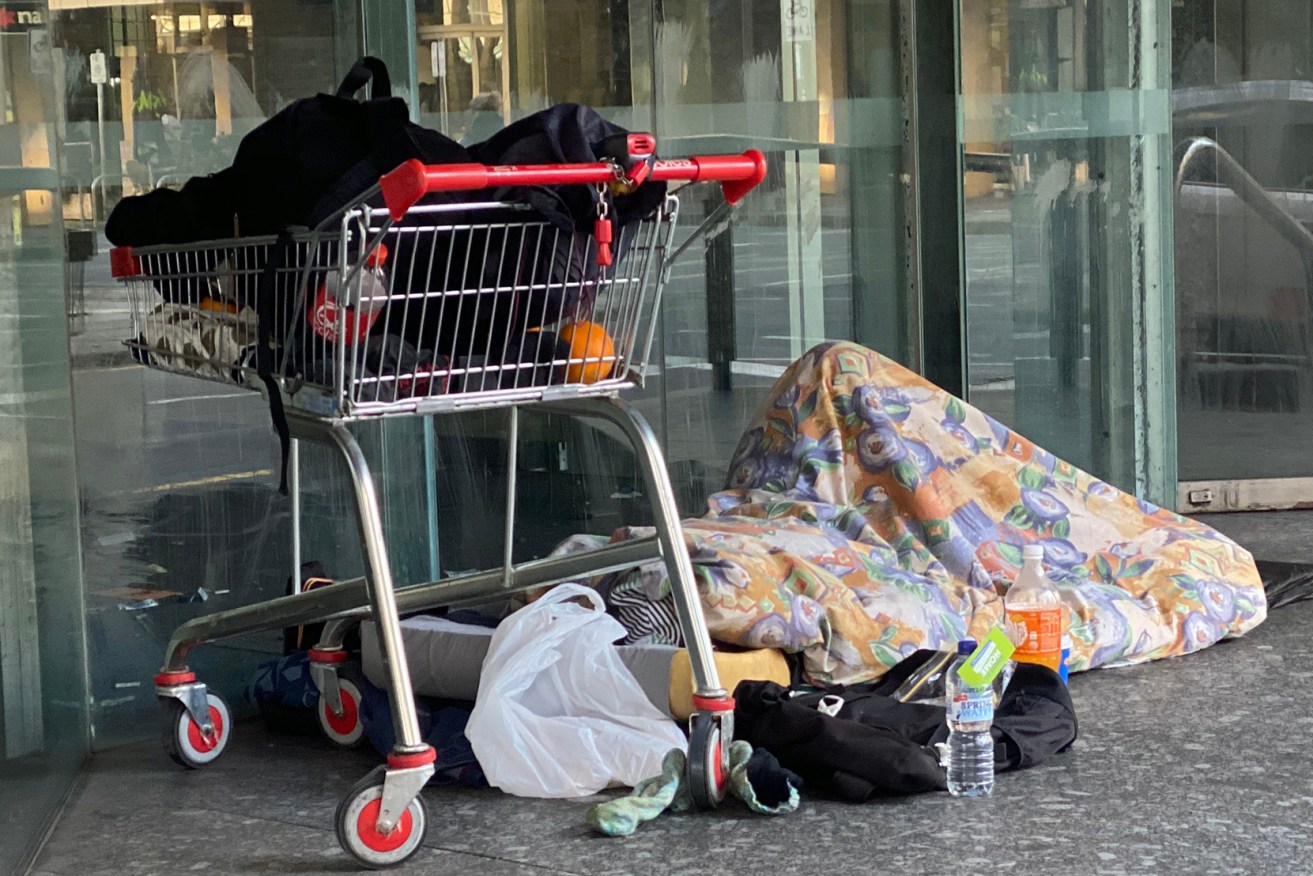Homelessness to “continue to grow” under SA Govt reform: sector
South Australia’s biggest homelessness organisations have asked the State Government to hit pause on its reform to the sector, amid concerns the proposed bureaucratic changes could lead to a reduction in funding for people experiencing homelessness.

Hutt St Centre calls for $15 million of funding as homeless numbers in South Australia continue to rise. Photo: Tony Lewis/InDaily
In a joint letter sent to the SA Housing Authority, seen by InDaily, the CEOs of 10 organisations including AnglicareSA, Uniting Communities, St Vincent de Paul Society, Junction Australia and Mission Australia, warn “homelessness will continue to grow” under the Government’s proposed new funding model.
The reform, branded “Future Directions for Homelessness”, is based on similar models used in the United Kingdom and is due to be implemented in South Australia in July next year.
It is touted by the SA Housing Authority as a “new system that will better meet the needs of South Australians experiencing homelessness” through the introduction of an “alliance model” that will redirect how non-government organisations are funded to deliver services to people experiencing homelessness.
Currently, the Government funds more than 30 organisations to deliver around 75 separate homelessness programs at a cost of $71.5 million a year.
To reduce what it describes as confusion, it has proposed grouping all homelessness organisations into “alliances” – two in metropolitan Adelaide, two covering regional areas of the state and a separate alliance dedicated to family and domestic violence support.
The alliances would bid for government contracts on behalf of the organisations they represent, with each to be headed by a “lead agency” and a manager.
A separate alliance system steering group would coordinate all five alliances.
The Housing Authority says the system won’t reduce the approximate $70 million a year it spends on reducing homelessness.
“Funding across the system will be maintained,” the authority’s website states.
“The goal is to make sure the funding is being spent more efficiently and effectively at a whole of system level to provide better services to vulnerable South Australians.”
But in their letter sent late last month, the 10 organisations, which describe themselves as representing “some of the largest services with an extensive footprint in homelessness support services”, wrote that they “share concerns about how the reform process has been undertaken”.
They wrote that the alliance model could burden organisations with additional administration costs, leading to a reduction of funding on the ground, “given there is no new service money”.
“At this point, it appears that a lead agency assumes responsibility for the alliance funding, administration, associated risks, and statutory compliance and reporting,” they wrote.
“Is it SAHA’s (SA Housing Authority’s) intention to reduce current service funding for these additional investments or is there an alternative?
“Is there a risk that after costs, there is less service money on the ground?”
The organisations go on to state that the Government’s proposed model fails to provide additional funding for affordable housing and “without deep investments… homelessness will continue to grow”.
“Whilst we are in strong agreement that access to safe, appropriate and affordable housing is an essential prerequisite for exiting out of homelessness, we are concerned that the strategy and reform process appears to be silent on addressing the need for increased supply of accessible housing,” they wrote.
According to SA Housing Authority documents presented to the sector at a workshop last month, features of “successful alliances” include a “no fault – no blame culture”, “commitment to no disputes”, “good faith” and “transparency”.
The alliances will be formed between April and July next year, ahead of the scheduled reform rollout.
But the organisations have pleaded with the Government to allow more time “given the scope of systematic realignment”.
“We strongly believe that this is not possible in a time period of two months,” they wrote.
“We believe further consideration should be given (to) a staged implementation timeline with more realistic milestones in the change management process.
“We think it is important the Department pause and give due consideration to the matters raised with a view to addressing them.”
A SA Housing Authority spokesperson told InDaily in a statement that the reform was needed to make it easier for people to use services in times of housing crisis.
The spokesperson said the alliance model would not lead to a reduction in services or funding.
“At the moment, we spend more than $70 million a year on homelessness services and we are not achieving long-term outcomes for South Australians,” they said.
“The Authority has consulted broadly with the sector about these reforms and recently held an initial series of three workshops with the sector to obtain feedback, and provide information to help organisations prepare for the new model.
“The Authority will continue to work with the sector as the reform of the homelessness system continues.”
Human Services Minister Michelle Lensink told parliament on Tuesday that it was “not surprising that there is some nervousness about it (the reform) going forward”, but “continuing to do the same thing and expecting a different outcome is the definition of madness”.
“It is probably quite novel for South Australia, but we believe it will lead to better outcomes for people who are experiencing homelessness,” she said.
But Opposition human services spokesperson Nat Cook said the sector’s letter “clearly shows there is a serious problem with this model of homelessness reform”.
“The shifting of the administrative burden to the sector without additional funds in an environment of increasing demand will see huge pressure on providers and a reduction in service provision,” she said.
“The model simply makes no sense and will not work without serious realignment and investment in social housing outcomes.
“The Minister must ensure the sector is properly consulted before implementing these sorts of reforms.”




